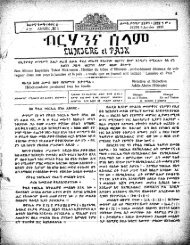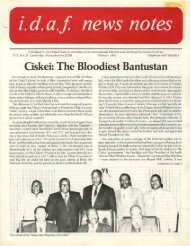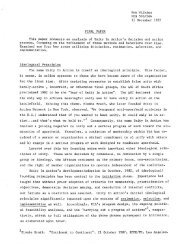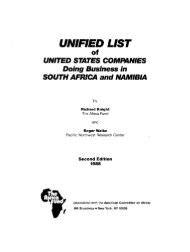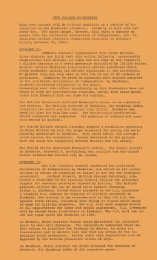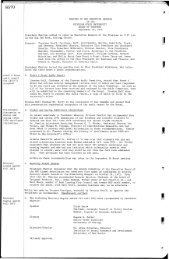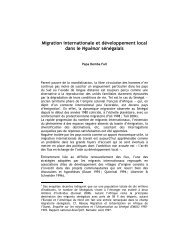the churches and southern africa - KORA
the churches and southern africa - KORA
the churches and southern africa - KORA
Create successful ePaper yourself
Turn your PDF publications into a flip-book with our unique Google optimized e-Paper software.
ACTION NEWS<br />
CORPORATE RESPONSES TO SPRING ACTIONS<br />
The burgeoning number of church-initiated<br />
stockholders challenges calling for a full disclosure of<br />
company operations in Sou<strong>the</strong>rn Africa has elicited a<br />
wide range of response from corporate America. A series<br />
of stockholder actions took place this past spring. Since<br />
<strong>the</strong>n, a few target companies have issued reports to <strong>the</strong>ir<br />
shareholders, in one form or ano<strong>the</strong>r, defending <strong>the</strong>ir<br />
operations in Sou<strong>the</strong>rn Africa <strong>and</strong> invariably touting <strong>the</strong><br />
line that increased black wages, employment, <strong>and</strong><br />
improved working conditions would all lead to changes in<br />
apar<strong>the</strong>id.<br />
General Motors <strong>and</strong> Goodyear Rubber<br />
The first company to respond to <strong>the</strong> disclosure<br />
resolution (<strong>and</strong> <strong>the</strong> largest U.S. investor in South Africa)<br />
was General Motors. In February, when <strong>the</strong> auto giant<br />
ga<strong>the</strong>red toge<strong>the</strong>r a roomful of institutional investors,<br />
spokesmen delivered a 7-page defense of its South African<br />
operations, thus pre-empting <strong>the</strong> thunder of annual<br />
meeting publicity. After this meeting, GM opposed<br />
adoption of <strong>the</strong> <strong>churches</strong>' disclosure resolution. Goodyear<br />
was <strong>the</strong> next to respond, in its proxy materials, claiming<br />
that disclosure would jeopardize <strong>the</strong> companies' good<br />
relations with <strong>the</strong> South African Government; nothing has<br />
been heard since. Mobil <strong>and</strong> IBM sued for peace when <strong>the</strong><br />
resolutions crossed <strong>the</strong>ir desks, agreeing to fully disclose,<br />
<strong>and</strong> thus avoid <strong>the</strong> bad publicity of a proxy battle.<br />
Mobil<br />
"Mobil in South Africa," published in July by Mobil<br />
Oil Corporation, is <strong>the</strong> most comprehensive report to date<br />
by a U.S. corporation on its operations in Sou<strong>the</strong>rn<br />
Africa. While comprising four pages, 8 inches by 14<br />
inches, <strong>the</strong> bulk of <strong>the</strong> Mobil report is devoted to a series<br />
of impressive looking charts outlining data on <strong>the</strong> South<br />
African subsidiary's employee positions, wage grades,<br />
application of benefits, training, <strong>and</strong> figures on company<br />
contributions. All figures are broken down by racial<br />
categories, <strong>and</strong> spread over a 10-year period for<br />
comparison. 0<br />
Issued as a result of an agreement between <strong>the</strong><br />
company <strong>and</strong> an agency of <strong>the</strong> United Church of Christ,<br />
<strong>the</strong> lengthy document also reveals relations with <strong>the</strong><br />
South African government, business <strong>and</strong> charitable<br />
contributions, <strong>and</strong> company attitudes during <strong>the</strong> decade<br />
covered by <strong>the</strong> report.<br />
The United Church Board for World Ministries places<br />
Mobil's performance "among <strong>the</strong> most sensitive <strong>and</strong><br />
progressive in U.S. industry," <strong>and</strong> Fortune magazine (see<br />
editorial) cites it as an enlightened leader. Mobil itself is<br />
"convinced that our presence in South Africa is clearly<br />
AND NOTES<br />
beneficial to <strong>the</strong> nonwhite as well as <strong>the</strong> white<br />
population... Yet <strong>the</strong> figures paint a portrait of<br />
limited opportunities for black South Africans.<br />
From its report we learn that Mobil began operations<br />
in South Africa in 1897; presently operates a refinery in<br />
Durban; a marketing operation for all of Sou<strong>the</strong>rn Africa;<br />
a one-quarter interest in offshore prospecting; <strong>and</strong> a<br />
one-third interest in a new South African refinery. The<br />
total work force of 2,852 persons includes 1,806 whites,<br />
798 Africans, 206 Coloureds, <strong>and</strong> 42 Asians; 86% of all<br />
African <strong>and</strong> Coloured employees fall into job categories 1,<br />
1A, 2, ahd 2A on a scale which advances to level 15.<br />
Mobil's desire to elevate blacks to higher skills <strong>and</strong> better<br />
pay must be questioned since only 8 in-company trainees<br />
in 1,971 were African, compared with 167 whites. In <strong>the</strong> 8<br />
preceding years, while 992 whites were trained, ONLY<br />
FOUR Africans participated in <strong>the</strong> training programs.<br />
The average African monthly wage at P4obil in 1972,<br />
according to a computation of figures from <strong>the</strong> charts<br />
presented with <strong>the</strong> report, is $148-$6 per month less<br />
than <strong>the</strong> average family's bare subsistence budget<br />
estimated by <strong>the</strong> Soweto Urban Bantu Council; 70% of<br />
Mobil's African workers fall into job classifications where<br />
average monthly wages are just $130. Because <strong>the</strong>se<br />
figures include a Christmas bonus of an additional<br />
month's pay, even <strong>the</strong> starkness of <strong>the</strong> $130 is more than<br />
actual monthly take home pay of <strong>the</strong> average wocker.<br />
Mobil claims to be one of <strong>the</strong> first companies that has<br />
establish a pension plan for its black workers, though <strong>the</strong><br />
commencement date <strong>and</strong> <strong>the</strong> economic value of this plan<br />
is not given. Most Africans receive medical treatment<br />
through <strong>the</strong> South African Government, which is,<br />
comments Mobil, "generally considered to be of excellent<br />
quality by international st<strong>and</strong>ards"! Mobil's charitable<br />
contributions, too, belie its claimed role as change-agent.<br />
Its $6,625 contribution to <strong>the</strong> South African Foundation<br />
in 1972 commits its resources to <strong>the</strong> international<br />
dissemination of pro-South African propag<strong>and</strong>a.<br />
Educational gifts favor <strong>the</strong> already privileged whites, who<br />
over <strong>the</strong> past decade received 7 times more from Mobil<br />
than Africans, Asians, <strong>and</strong> Coloureds who constitute 88%<br />
of <strong>the</strong> country's population.<br />
Perhaps <strong>the</strong> most revealing aspect of Mobil is <strong>the</strong><br />
subjects it chooses not to disclose, or lightly glances over.<br />
Asked in <strong>the</strong> resolution to give a "detailed explanation"<br />
of <strong>the</strong> myriad of apar<strong>the</strong>id laws that <strong>the</strong> company is<br />
subject to, Mobil listed but four, without even a word of<br />
explanation on <strong>the</strong>se. Although requested to reveal <strong>the</strong><br />
exact nature <strong>and</strong> extent of its South African military <strong>and</strong><br />
government contracts, no charts were to, be seen, but <strong>the</strong><br />
company was kind enough to inform us that, yes, it did<br />
indeed contract with Government agencies, without<br />
mentioning a single one, refusing to cite dollar figures, or<br />
even reveal <strong>the</strong> percentage of total sales devoted to <strong>the</strong><br />
military, etc.


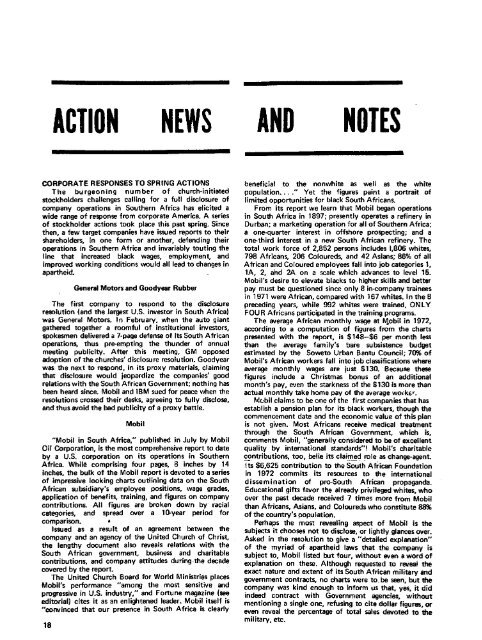
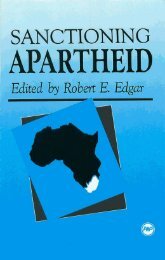
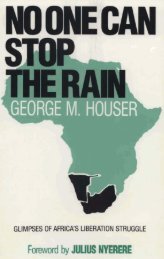

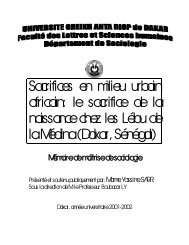
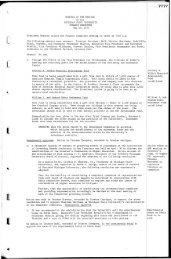
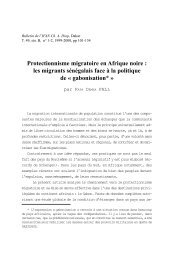

![Synthèse [6] DEFALL..INSTRAW.pdf - Matrix](https://img.yumpu.com/17880734/1/190x245/synthese-6-defallinstrawpdf-matrix.jpg?quality=85)
